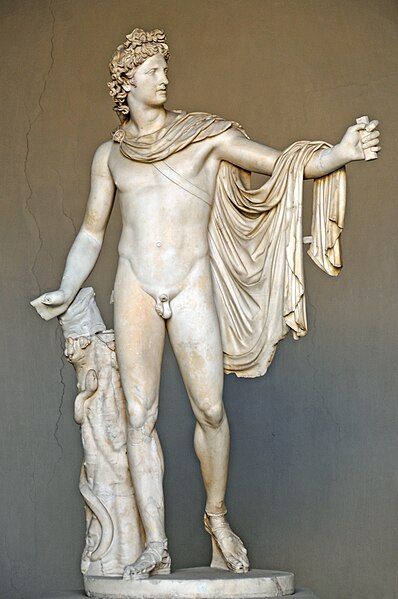Asclepius is a hero and god of medicine in ancient Greek religion and mythology. He is the son of Apollo and Coronis, or Arsinoe, or of Apollo alone. Asclepius represents the healing aspect of the medical arts; his daughters, the "Asclepiades", are: Hygieia, Iaso, Aceso, Aegle and Panacea. He has several sons as well. He was associated with the Roman/Etruscan god Vediovis and the Egyptian Imhotep. He shared with Apollo the epithet Paean. The rod of Asclepius, a snake-entwined staff, remains a symbol of medicine today. Those physicians and attendants who served this god were known as the Therapeutae of Asclepius.
Asclepius with his serpent-entwined staff, Archaeological Museum of Epidaurus
Roman coin from Odessos showing Asclepius with Hygieia on one side and Gordian III's portrait on the other side (35mm, 28g)
Asclepius (center) arrives in Kos and is greeted by Hippocrates (left) and a citizen (right), mosaic, 2nd–3rd century AD
Votive relief of Asclepius, Epione and Hygieia. Mid-4th cent. BC, Acropolis Museum, Athens.
Apollo is one of the Olympian deities in classical Greek and Roman religion and Greek and Roman mythology. Apollo has been recognized as a god of archery, music and dance, truth and prophecy, healing and diseases, the Sun and light, poetry, and more. One of the most important and complex of the Greek gods, he is the son of Zeus and Leto, and the twin brother of Artemis, goddess of the hunt. He is considered to be the most beautiful god and is represented as the ideal of the kouros. Apollo is known in Greek-influenced Etruscan mythology as Apulu.
Apollo Belvedere, c. 120–140 CE
Apollo, God of Light, Eloquence, Poetry and the Fine Arts with Urania, Muse of Astronomy (1798) by Charles Meynier
Apollo, fresco from Pompeii, 1st century AD
Apollo sculpture, Palazzo Giusti Verona, Mannerist art with typical contrapposto








